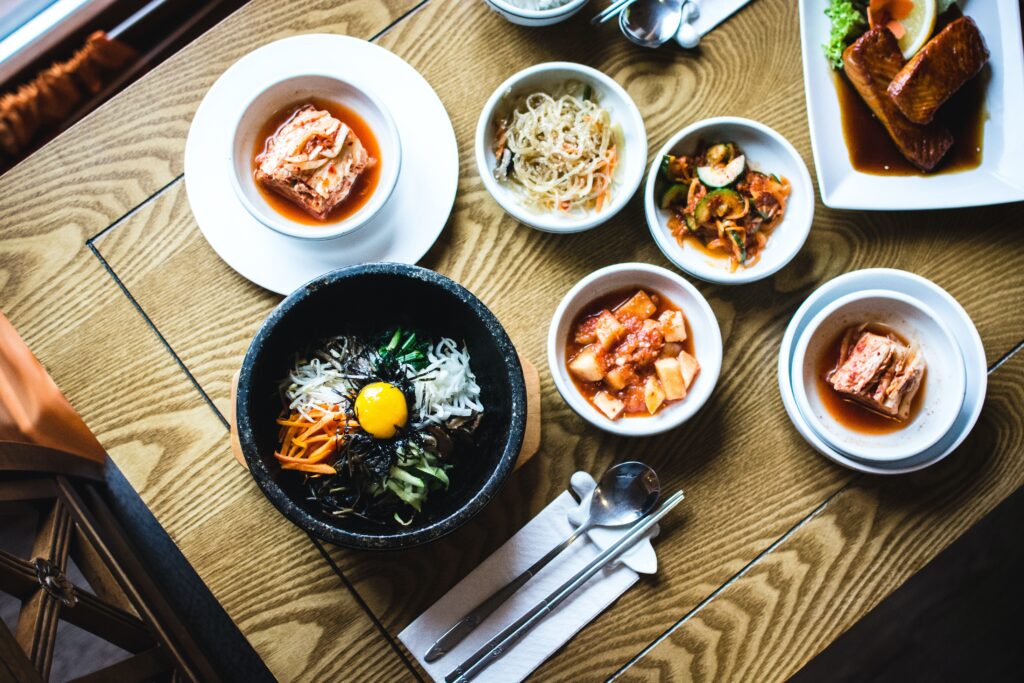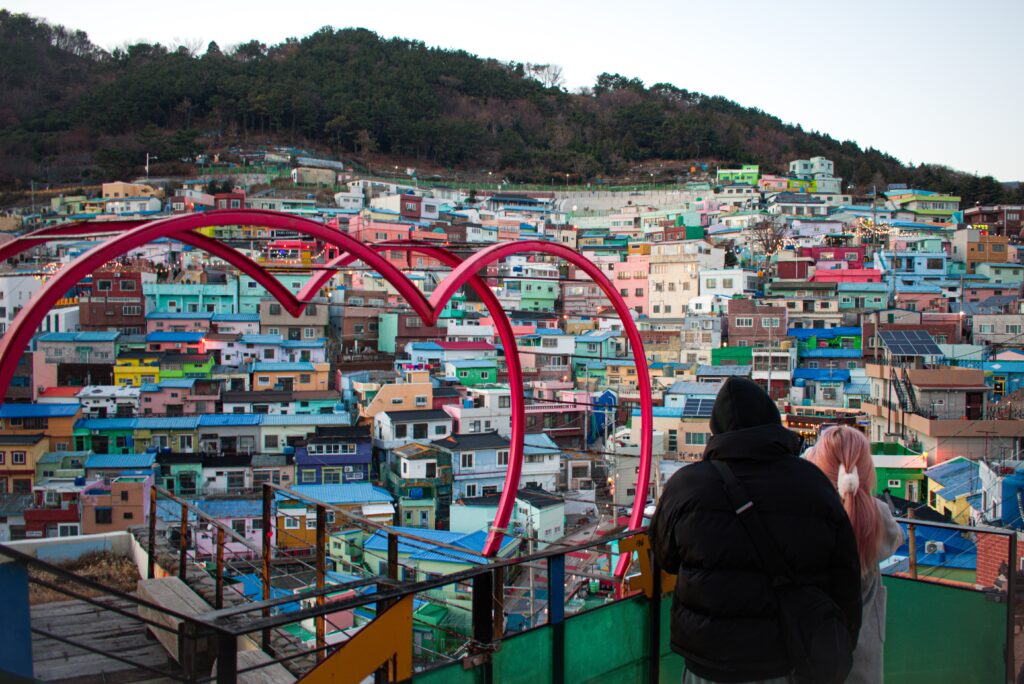Introduction to South Korea: A Tapestry of Tradition, Modernity, and Cultural Influence
South Korea, officially known as the Republic of Korea, is a country where ancient traditions seamlessly intertwine with modern advancements. This dynamic nation, located on the southern part of the Korean Peninsula, offers a unique blend of rich cultural heritage and cutting-edge innovation. From its welcoming people and bustling cities to its vibrant cultural scene and diverse culinary delights, South Korea is a captivating destination that continues to make a significant impact on the global stage. This introduction explores South Korea’s people, cities, culture, currency, climate, food, and its influential movie and music industries.
The People

The people of South Korea are known for their resilience, warmth, and strong sense of community. South Koreans place great importance on family, respect for elders, and educational attainment, reflecting deep-rooted Confucian values. This emphasis on family and societal harmony is evident in daily life and social interactions. The rapid modernization and economic growth experienced by South Korea over recent decades have fostered a society that is both progressive and deeply respectful of its traditions.
The younger generation, in particular, embodies a spirit of innovation and creativity. South Korea’s global influence in technology, fashion, and entertainment is largely driven by its younger, forward-thinking population. The combination of traditional values and modern aspirations creates a vibrant cultural landscape that continues to attract international attention and admiration.
Cities

South Korea’s cities are a fascinating blend of historical charm and modern sophistication. Seoul, the capital and largest city, is a bustling metropolis that offers a mix of ancient palaces, vibrant shopping districts, and cutting-edge technology. Key attractions include Gyeongbokgung Palace, a stunning example of traditional Korean architecture; Myeongdong, a bustling shopping area renowned for its street food and fashion; and N Seoul Tower, which provides panoramic views of the city’s skyline.
Busan, South Korea’s second-largest city, is famous for its beautiful beaches, lively ports, and cultural festivals. Haeundae Beach and Gwangalli Beach are popular destinations for both locals and tourists, offering scenic coastal views and a variety of recreational activities. Busan is also home to the Busan International Film Festival, which celebrates global cinema and attracts film enthusiasts from around the world.
Incheon, located near Seoul, is known for its modern infrastructure, including Incheon International Airport, one of the world’s busiest and most efficient airports. The city features impressive waterfront areas such as Songdo Central Park, reflecting South Korea’s commitment to sustainable urban development.
Culture
South Korean culture is a rich tapestry woven from its long history and contemporary influences. Traditional Korean culture is heavily influenced by Confucianism, which emphasizes respect, harmony, and the importance of family. This heritage is reflected in various cultural practices, such as the wearing of hanbok (traditional Korean clothing), the preparation of kimchi (fermented vegetables), and the practice of taekkyeon (traditional martial art).
In contrast, modern South Korean culture is characterized by its global reach and influence. The Hallyu Wave, or Korean Wave, has significantly shaped global pop culture. This phenomenon includes South Korean dramas (K-dramas), films, and especially K-pop. The country’s cultural landscape is a dynamic fusion of preserving traditional values while embracing contemporary trends.
Currency

The currency of South Korea is the won, represented by the symbol KRW (Korean Won). The won is essential to daily life in South Korea and reflects the country’s robust economic environment. As a stable and globally significant economy, South Korea’s currency supports a high standard of living and contributes to its influential role in international markets.
Climate

South Korea experiences a temperate climate with four distinct seasons, each offering its unique appeal. Spring and autumn are particularly celebrated for their mild temperatures and beautiful natural landscapes. Spring brings the blooming of cherry blossoms and vibrant flowers, while autumn showcases a spectacular display of foliage in hues of red, orange, and gold.
Summer in South Korea can be hot and humid, with monsoon rains typically occurring from June to August. This season is marked by high temperatures and heavy rainfall, resulting in a lush, green landscape. Winter brings cold temperatures and snowfall, particularly in northern regions and mountainous areas. The winter season is ideal for outdoor activities such as skiing and exploring picturesque snowy vistas.
Food

South Korean cuisine is a delightful exploration of flavors, textures, and traditions. Kimchi, a staple of Korean cuisine, is a spicy, fermented vegetable dish that accompanies almost every meal. Bibimbap, a mixed rice dish with vegetables, meat, and a spicy sauce, and bulgogi, marinated beef grilled to perfection, are popular favorites. Korean food is also known for its communal dining style, where dishes are shared among diners, promoting a sense of togetherness.
Street food plays a significant role in South Korean culinary culture. Markets like Gwangjang Market in Seoul offer a wide array of delicious street foods, including tteokbokki (spicy rice cakes), hotteok (sweet pancakes), and odeng (fish cakes). The country’s food culture reflects a deep appreciation for fresh ingredients, bold flavors, and communal dining experiences.
Movie Industry
South Korea’s film industry has garnered international acclaim for its high-quality productions and innovative storytelling. South Korean films often explore complex themes and offer unique perspectives, earning recognition at global film festivals. Directors such as Bong Joon-ho and Park Chan-wook have achieved significant success, with films like “Parasite” and “Oldboy” receiving critical acclaim and numerous awards. “Parasite,” in particular, made history by winning the Palme d’Or at Cannes and the Academy Award for Best Picture, showcasing the global impact of Korean cinema.
Music Industry

The South Korean music industry, particularly K-pop, has achieved remarkable global success. K-pop groups like BTS, Blackpink, and EXO have captured the world’s attention with their catchy music, elaborate performances, and stylish visuals. The genre’s influence extends beyond music, impacting fashion, beauty, and even language learning. The global reach of K-pop is supported by a robust industry infrastructure, including talent agencies, production companies, and dedicated fan communities.
In summary, South Korea is a nation where tradition and modernity coexist in harmony. Its vibrant cities, rich cultural heritage, dynamic entertainment industry, and diverse culinary offerings create a multifaceted experience for residents and visitors alike. Whether exploring the historic palaces of Seoul, enjoying the beautiful beaches of Busan, or delving into the world of Korean cinema and music, South Korea promises a journey of discovery and excitement.
Welcome to Korea, the land of the morning calm! Korea is a beautiful country located in East Asia, known for its unique blend of ancient traditions and modern technology.

Korea is also home to some stunning natural landscapes, including the beautiful Jeju Island, which is famous for its volcanic landscape and beautiful beaches. You can also explore the lush forests and mountains, or take a relaxing stroll along one of the many rivers that crisscross the country.
So come and experience all that Korea has to offer – from its delicious food to its stunning landscapes to its vibrant pop culture scene. You won’t be disappointed!



